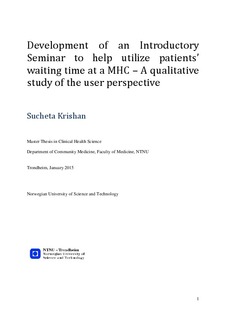Development of an Introductory Seminar to help utilize patients’ waiting time at a MHC - A qualitative study of the user perspective
Master thesis
Permanent lenke
http://hdl.handle.net/11250/281626Utgivelsesdato
2015Metadata
Vis full innførselSamlinger
Sammendrag
Background:In Norway, mental health disorders are the second highest cause of people on
disability pension and the highest cause of lost working years. Due to this continuous increase
in the number of psychiatric patients, MHCs struggle to meet demand, thereby, resulting in
long waiting times for the treatment. This study tries to find what information is necessary for
patients to cope with their problems while waiting for the actual treatment to start. It will be
done by developing a pre-therapy introductory seminar, aimed at providing patients with the
relevant information and prepare them for active participation in the treatment.
Method:A qualitative method with semi-structured individual interviews was applied in this
study. Participants were strategically chosen in relation to the research question and data was
collected by interviewing 10 patients in two roundsof interviews at Trondheim and
Haugesund, respectively. Two rounds of interviews were conducted for achieving saturation
of data and to gain better insight information pertaining to the research question. The
interviews were audio taped and transcribed and were analyzed in four steps: (a) from raw
data to topics (b) from topics to codes (c) from codes to sense-carrying units (condensation)
and (d) from condensation to descriptions.
Results: Following three main themes are highlighted in results:
1. First topic describes why participants want information or why they think information
is necessary during waiting time. Participants feltthat information during the waiting
time will lead to better control over their own ailments with more insights and better
understanding of their situations
2. The second topic describes how information should be conveyed or how the
introductory seminar should be organized. Participants preferred oral information than
written and the information should be presented andexhibited in such a way that they
can make optimal use of the seminar. The participants also wanted information about
the institution and the personnel
3. The third topic describes what information the participants want or in other words
what should be the content of the introductory seminar. It was important for the
participants to receive information about the mental health in general, the course of
treatment, what types of treatment methods are available and how they could get these
treatments. This information can make the treatmentchoice easier and will help them
understand the benefits and side-effects of variousavailable treatment methods. The
3
main findings in this study corresponded largely with previous research and literature.
In addition to this, most participants thought thatuser involvement is important and it
is necessary to know how to be an active participant. Some of the participants wanted
to know what they can do themselves and how and wanted to understand their patient
rights at a MHC. Most participants also wanted to get information about various user
organizations that can help them cope with their problems.
Conclusions:This study shows that teaching / education is regarded as useful for patients
waiting for their treatment at a MHC. This could increase patients' knowledge about making
choices about their treatment and to be more activein their treatments. Most of the
participants wanted information about mental healthdisorders or general mental problems,
treatment methods and the outcomes. It was important that they had a role in their treatment,
including wanting more knowledge with regards to user involvement. Also, the necessity of
information about patient rights and user organizations emerged clearly from the participants
during interviews.
Utgiver
NTNUBeslektede innførsler
Viser innførsler beslektet ved tittel, forfatter og emneord.
-
Patient activation in Europe: an international comparison of psychometric properties and patients' scores on the short form Patient Activation Measure (PAM-13)
Rademakers, Jany; Maindal, Helle Terkildsen; Steinsbekk, Aslak; Gensichen, Jochen; Brenk-Franz, Katja; Hendriks, Michelle (Peer reviewed; Journal article, 2016)Background To allow better assessment of patients’ individual competencies for self-management, the Patient Activation Measure (PAM) has been developed in the USA. Because the American studies have shown the PAM to be ... -
Competence development in patient education: The perspective of health professionals and patients with experience in patient education in cardiac care
Svavarsdóttir, Margrét Hrönn (Doctoral thesis at NTNU;2016:13, Doctoral thesis, 2016) -
Gynecological cancer patients' attitudes toward follow-up care after cancer treatment: Do preferences reflect patients' experience? A cross-sectional questionnaire study
Fidjeland, Heidi Lidal; Brekke, Mette; Stokstad, Trine; Vistad, Ingvild (Journal article; Peer reviewed, 2018)Introduction Due to an increasing number of cancer patients, new follow‐up models are being debated, among them follow‐up by general practitioners. Before changing surveillance, it is important to explore patients’ views. ...
